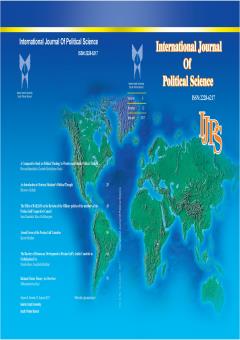A Study of Human Development Indicators in Iran with an Emphasis on Economic Corruption (2013-2021)
Subject Areas :
Hossein Akbari
1
,
Mohammad Tohidfam
2
*
![]()
1 - partment of Political Science, Kish International Branch, Islamic Azad University, Kish, Iran
2 - Department of Political Science, Central Tehran Branch, Islamic Azad University, Tehran, Iran
Keywords: Good Governance, Human Development, Economic Corruption, Corruption Perceptions Index,
Abstract :
The Corruption Perceptions Index, a critical international index based on public opinion sur-veys, reflects the level of corruption in countries. It emphasizes the perceptions and views of experts and elites regarding the extent of bribery and embezzlement among decision-makers and policymakers. Economic corruption poses a significant obstacle to economic growth and development, leading to social ethics issues, increased poverty and injustice, and reduced gov-ernance legitimacy and efficiency. This study, employing a descriptive-analytical method and a deductive approach based on the theoretical framework of good governance, aims to answer the main and subsidiary question: what is the relationship between human development indi-ces and economic corruption in Iran from 2013 to 2021? And what is the correlation between economic corruption and human development indices? The varying levels of economic corrup-tion in Iran during this period have significantly impacted the human development indices in society, and these impacts have evolved. Despite substantial efforts to control economic cor-ruption through modern information technologies, the Corruption Perceptions Index has seen a decline of six ranks during this period. Furthermore, economic corruption and human devel-opment indices typically exhibit an inverse and often negative correlation. This research delves into the relationship between human development indices and societal and economic corruption, providing empirical evidence of their impact and relationship.
Abdollahi, Ali; Tavakoli, Nazanin. (2020), The Role of Information Technology in Transparency and Reducing Cor-ruption, Cheshmandaz Publishing
Ackerman, R. (2015). Corruption. A study in political economy. London/ New York Academic Press, 256-267.
Alini, Ehsan. (2022), The Roots and Struc-tural Processes of Economic Corrup-tion in Iran, Quarterly Journal of Social Planning and Development, Issue 51, p.222
Al-Marhubi, F, A (2016). Corruption and inflation. Economics Letters, 66(2), 199-202.
Anbari, Mousa. (2018), Sociology of Devel-opment, Approach to Quality of Life and Human Development, p.385
Beheshti, Mohammad. (2000), Analysis of Employment and Unemployment and Providing Suitable Solutions, Journal of the Faculty of Literature and Humanities, p.80
Behroozi, Mohammad and colleagues. (2019), Examining the Relationship between Quality Indices and Rule of Law, Jihad University Publishing
Damir, P. and Prake, E.M. (2011). Corrup-tion and inflation in Transition EU Members, Journal of Public Admin-istration, 8(1), 475-498
Fisman, Raymond. (2020), Translation by Farhadipour, Mohammad Reza. Cor-ruption: What Everyone Needs to Know, Termeh Publishing
Hassani Moghaddam and colleagues. (2021), The Impact of Corruption Control and Economic Policies on Economic Growth, Quarterly Journal of Econ-ometric Modeling, Issue 44
Hassani Moghaddam and colleagues. (2021), The Impact of Corruption Control and Economic Policies on Economic Growth, Quarterly Journal of Econ-ometric Modeling, Issue 44
Hosseini and et al. (2020), Legal Dimensions of Joining the FATF Group, Interna-tional Studies Quarterly, p.51
Jafari, Anoosh, and colleagues. (2019), Bu-reaucratic Corruption in Today's Iran, Jabari Publishing, pp.30 and 71
Ministry of Industry, Mining, Trade Portal, 2006-2017, p.3
Nezam Barati, Amir. (2023), Good Govern-ance and Combating Economic Cor-ruption, Majd Scientific and Cultur-al Assembly Publishing, p.2
Nezam Barati, Amir. (2023), Good Govern-ance and Combating Economic Cor-ruption, Majd Scientific and Cultur-al Assembly Publishing, p.2
Roodsaz, Habib. (2023), Evaluation of Strat-egies in Anti-Economic Corruption Organizations, Tadbir Economy Publications, p.2
Sadri Oskooi, Seyed Mehdi, and colleagues. (2021), Examining the Relationship between Corruption and Human Capital, Islamic Economics and Banking Journal, Issue 34, Volume 10, p.160
Salehi Vasegh, Mohammad Reza; Mokarami Pour, Mohammad Baqer. (2019), Transparency and E-Government, Quarterly Journal of Governance and Society Empowerment, p.4
Tohidfam, Mohammad. (2009), The Integra-tion of Action and Structure in the Thought of Giddens, Bourdieu, and Habermas and Its Impact on New Sociology, Political Science Re-search Journal, Issue 15
Tohidfam, Mohammad. (2018), Good Gov-ernance and Social Security System, Scientific and Cultural Publications, p.218
Torki, Gholamabbas. (2021), Analysis of Financial Corruption in Iran, Mizan Publishing
https://otaghiranonline.ir/UFiles/Images/2018/9/16/Img20180916005755147.jpg
https://www.ohchr.org/en/good-governance/about-good-governance
https://www.unescap.org/sites/default/files/good-governance.pdf
https://danakhabar.com/005NCN
https://artaapplyabroad.com/?p=3431
www. g/cpitransparency.org

